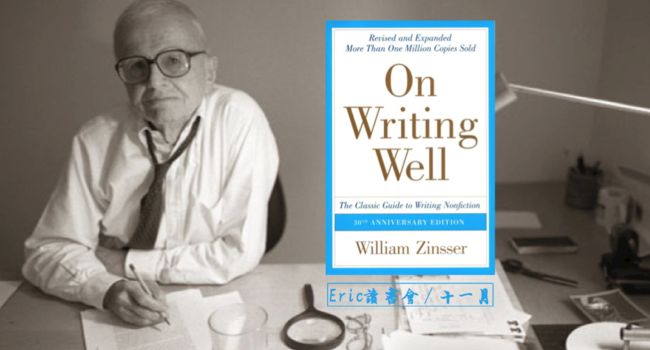PART 1 Gist
Most of the business writings lack humanity and are imbued with pomposity. In Zinsser's perspective, people should stick to the principles of clarity, simplicity, brevity when they do writing in their jobs. He admonished that a muddled style reflects a muddled thinker or a person too arrogant, or too dumb, or too lazy to organize his thoughts. The way to warm up any person or institution, Zinsser suggests, is to locate the missing "I" as it is the most interesting element in any story.
PART 2 Expressions
1. We don't want to go anywhere with a mind that expresses itself in such suffocating language.
suffocate: (v.) [ˈsʌfəkeɪt] (使某人)窒息而死; 阻碍,遏止 SYN stifle
Can you open a window? I'm suffocating.
Jealousy can suffocate any relationship.
suffocating: (a,); suffocation (n.)
2. We are suspicious of pretentiousness, of all the fad words that the social scientists have coined to avoid making themselves clear to ordinary mortals.
fad word:(短期的)流行词
ordinary/ lesser/ mere mortals: ordinary people, as compared with people who are more important, more powerful, or more skilled, used humorously
She dines in the executive suite, while we lesser mortals use the staff cafeteria.
3. His is squandering a rich resource: himself.
squander:[ˈskwɒndə(r)] 挥霍 to carelessly waste money, time, opportunities etc
The home team squandered a number of chances in the first half.
squander sth on sth
They squandered the profits on expensive cars.
4. He falls back on the jargon of his profession, where he feels safe.
fall back on sb/ sth, have sb/ sth to fall back on: to use sth or depend on sb's help when dealing with a difficult situation, especially after other methods have failed
She has no relatives to fall back on.
Where negotiation fails they must fall back on the law.
fallback: (n.) 可依靠的东西 SYN backup
Do you have a fallback option?
It's wise to have an extra video player as a fallback.
5. Children, and staff, must work in an atmosphere that is conducive to learning.
be conducive to sth: 有助于...的 formal, if a situation is conducive to sth such as work, rest etc, it provides conditions that make it easy for you to work etc
Make your bedroom as conducive to sleeping as possible.
6. But when the educators wrote to explain how they proposed to di their educating, they vanished without a trace.
trace: a small sign that shows that sb or sth was present or existed
There was no trace of anyone having entered the room since then.
Officers were unable to find any trace of drugs.
disappear/ vanish/ sink without (a) trace: disappear completely, without leaving any sigh of what happened
The plane vanished without a trace.
7. I told them not to use the special vocabulary of education as a crutch.
crutch: [krʌtʃ] 拐杖;支持物
I was on crutches(= using cruthches) for three months after the operation.
I was things got worse at work, he began to use alcohol as a crutch.
8. A shortfall will be experienced in anticipated profitability.
shortfall: the difference between the amount you have and the amount you need or expect 亏空 SYN deficit
an estimated shortfall of about $1 million
Parents have been asked to pay $3o each to cover the shortfall in the budget.
9. I found almost all of it lacking in human juices and much of it impenetrable.
impenetrable: 这里指晦涩难懂的 very difficult or impossible to understand
impenetrable legal jargon
10. I said that MR. Bell was being done a disservice.
do sb/ sth a disservice, do a disservice to sb/ sth: to do sth that gives other people a bad opinion of sb or sth
The fans have done the game a great disservice.
disserve: (v.)
Hart's poems are disserviced by the decision to squeeze three or even four short pieces onto one page.
PART 3 Writing
I urged them to believe in themselves as writers and not to relinquish control. They replied that this was easier said than done in hierarchial corporations, where approval of written reports is required at a succession of higher levels. I sensed an undercurrent of fear: do things the company way and don't risk your job trying to make the company human.
还记得我去年第一次给律所投简历的时候,我在简历后面附了一份自我陈述,用日常的语言去讲述自己对于法律的认知和对未来的打算。我当时交的时候还有些自我得意。后来那家律所第一轮面试的时候HR对我说,“你的简历后面附的自我陈述像小学生写的,这是我看过的最不正式的简历了,要不是看在你绩点高,我根本不会让你进面试。” 那个HR后来还是在面试的时候把我刷掉了。此后,我每次投简历都按照程式化的模板来写,再不会去添加那些"human elements"。读这一章的时候,我心里一直有一个疑问,想必大多数人都反感那些职场上的晦涩、生硬的措辞,但如果不是像Zinsser这样有名望的作家或者是本身已经在企业里有地位的人士,谁敢于去打破这些框架和程式呢?我经常会读到工作邮件中别人写的“顺颂,时祺”等结束语,每次我心里都会嘀咕,你就不能说人话吗?但现实是,我们的工作和生活确实被这些晦涩难懂的语言给框住了, 我们很难去逃离和改变。就法律领域来说,比如某人欠钱不还,在法律文本上必须写的是“债务人未履行其到期债务”,如果你愿意以身涉险去化繁为简,那你也得做好被炒鱿鱼的准备。
